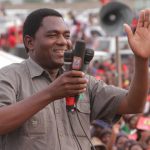Z ALLAN NTATA: CAN MALAWIANS IMPEACH MUTHARIKA? WHY NOT!
Published on February 26, 2016 at 3:03 PM by Robert Ngwira
A discussion Press Release
“Impeachment is not a remedy for private wrongs; it’s a method of removing someone whose continued presence in office would cause grave danger to the nation.” – Charles Ruff
INTRODUCTION
Under the Malawian Constitution, the President of Malawi can be removed from office only through impeachment.
Impeachment is a formal process in which an official is accused of unlawful activity and the outcome of which can lead to the removal of that official from office or other punishment. In the United States, when it was clear to most American that president Richard Nixon had violated laws and acted in breach on the American constitution, impeachment proceedings were called for. Richard Nixon honorably resigned rather than face the embarrassment of being impeached and his Vice President, Gerald Ford, succeeded him to the presidency. It is surprising and sad that in the wake of President Peter Mutharika’s serious violations of the constitution he swore to defend, parliamentarians, especially the strong MCP block, are busy discussing an Arab Spring-like uprising when the constitution already provides them with a legal and legitimate solution.
Section 86 of the Malawi Constitution gives Parliament the sole power to try impeachments. Impeachment is only the first of two stages, and conviction requires a two-thirds vote. Impeachment does not necessarily result in removal from office; it is only a legal statement of charges, parallel to an arraignment in criminal law. An official who is impeached faces a second legislative vote, which determines conviction, or failure to convict, on the charges embodied by the impeachment. A supermajority is required to convict. Although the subject of the charge is criminal action, it does not constitute a criminal trial; the only question under consideration is the removal of the individual from office, and the possibility of a subsequent vote preventing the removed official from ever again holding political office in the jurisdiction.
IMPEACHABLE OFFENSES AND PROCESS
According to the Constitution, indictment and conviction by impeachment can only be on the grounds of serious violations of the Constitution or serious breach of the written laws of Malawi. Bribery, perjury, and treason are among the least ambiguous serious reasons meriting impeachment, but the ocean of wrongdoing encompassed by the Constitution’s stipulation of “serious breach of the written laws of the republic” is vast. Abuse of power and serious misconduct in office can fit this category. It is easy to confuse political animosity with genuine crimes and offences. Since Parliament, the vortex of partisanship, is responsible for indicting, trying, and convicting the President, it is important for the legislature to be careful about ensuring that the matters at issue are those of a legal nature rather than political ones.
That being said, it can still be argued that because the process is more a political than a legal one, an impeachable offense could be whatever the majority of the Parliament considers it to be at a given moment in history.
There is no body of precedents relating to impeachment simply because Section 86 of the Constitution has never been tested. Similarly, the procedure for impeachment proceedings has never really been clearly established in Malawian Parliamentary standing orders, or if it has, this has been done only recently. It could be proposed that impeachment could be set in motion by charges being made on the floor, or from facts developed and reported by an investigating committee or some other committee of the House. It could further be proposed that since a proposition to impeach is a question of high privilege in the House it must at once supersede any other business in order under the rules governing the order of business.
The impeachment process is a two-step procedure. Parliament must first pass, by a two-thirds majority, articles of impeachment, which constitute the formal allegation or allegations. Upon their passage, the defendant has been “impeached”. Next, the Parliament tries the accused. The Constitution is silent on who shall preside, suggesting that this role falls to the House’s usual presiding officer.
To convict the accused, another two-thirds majority of the members of the National Assembly is required. Conviction automatically removes the defendant from office. Following conviction, the individual is also barred from holding future office, elected or appointed. Conviction by the National Assembly does not bar criminal prosecution.
IMPEACHING THE PRESIDENT
Theoretically, impeaching a President could be done in a day. In the morning a Member of Parliament could propose one or more Articles of Impeachment and then a vote could be called. A two-thirds majority is needed to impeach. In the afternoon the House could try the case. A two-thirds vote could then convict. As has been stated above, ejecting a person from the presidency is political, not judicial. The only punishment to be meted out is removal from office. Justice per se does not come into the principle underlying the matter of impeachment. Think of it this way: If a Member of Parliament has done a fabulous job for four years, but fails to win reelection, does she have any redress? The answer is negative. She holds office at the pleasure of the voters, and they indicate their pleasure every five years. A President takes office at the pleasure of the voters, but he or she holds onto office at the pleasure of Parliament.
However, although Parliament is procedurally bound only by the rules it makes for itself, the Constitution stipulates that rules of natural justice must be observed. This means that the President must be afforded an opportunity to know the accusations and be given a chance to respond as well as be represented by Counsel.
What is required therefore, in order to impeach the President, is evidence of a breach of some law. This could be any law, and could then be made to be a “serious breach” as required by the Constitution. Evidence of a breach of at least some recognizable law is crucial because although the process itself is political, if there are no justifiable underlying legal reasons, its kangaroo court nature would be quickly exposed and end up embarrassing the advocates of the impeachment, and defeating the very purpose the whole strategy was supposed to achieve.
THE STRATEGY
a. Legal
In order to justify any talk of impeachment at all, the President must be proved to have broken a Law. Party matters are not enough. Presiding over a police force (as commander in chief) that arrests illegally parliamentarians that are protected by parliamentary immunity, on the other hand, is a serious breach of the written laws of the republic. Presiding over a government that is allowing citizens to die of hunger, and failing to provide adequate health services could constitute criminal negligence – a serious offence indeed.
b. Parliament
There is no certainty surrounding the issue of whether there are clear procedures for impeachment in Parliament. This uncertainty must be cleared and clear and definable standing orders for such a motion established. When the matter comes before the house, there should be no hesitation as to how it will be handled.
ANTICIPATED GOVERNMENT COUNTER STRATEGY, WHEN RUMORS OF IMPEACHMENT START TO SWIRL
It is fair to presume that the President would hate to lose the Presidency and that would not go down without a fight. It is therefore prudent to anticipate the weapons in his arsenal that will have to be neutralized.
It is almost certain that once the matter of impeachment is discussed in any shape or form, the President will seek legal counsel. His Counsel would seek to stop or frustrate the impeachment process by using the courts to obtain an injunction or some other legal remedies. The need to have in place a legal strategy to deal with inevitable response cannot be overemphasized.
CONCLUSION
The impeachment of the incumbent i.e. President Arthur Peter Mutharika seems to be the only way in which Malawi, a country rapidly heading towards the doldrums of social existence, can be saved. It is a simple but delicate maneuver that will need careful planning and intelligent and meticulous stage management.
The country at large is suffering, and Mutharika is already under attack from various groups over economic and governance matters. The current discontent and restlessness will only translate into riots and civil upheavals if nothing is done and done in a hurry to arrest the situation.
Having carefully examined the current state of national politics and come to the conclusion that the impeachment question needs to be pursued, a strategy can be carefully considered that will respond to prospective counter-strategies that Mutharika may offer.
ADDENDUM: POSSIBLE IMPREACHMENT GROUNDS
GROUND 1
• Illegal moratorium on Homosexuality laws
President Peter Mutharika unilaterally and illegally, has placed a moratorium on certain laws of the republic such as the homosexuality laws, without any such powers being given to him in any written law of the republic.
This is but one example of a totally unacceptable, illegal and unjustifiable usurping of powers on an issue which all Malawians ought to have a say. And yet, here is someone who took an oath to preserve and defend the Constitution (s. 81(1)), flouting it at will.
GROUND 2
• Illegal arrests of Members of Parliament
President Mutharika allowed or may have instructed his agents, the police to illegally arrest MCP parliamentarians while parliament is seating, for offences that are not exempted from parliamentary immunity based on flimsy evidence that can reasonably be construed to have been obtained by infringing on the accused’s freedoms.
GROUND 3
• Criminal Negligence
President Mutharika is a negligent President, as evidenced by his refusal to:
1. Admit and therefore begin fixing the hunger problems in the country and present to the nation tangible and coherent plans to deal with the problem.
2. Admit and therefore facilitate fixing the sad state of the health services in the country which have totally collapsed, leading to patients dying because of lack of medicines and food.
THE URGENCY OF IMPEACHING PRES MUTHARIKA
Impeachment is not a remedy for private wrongs; it is a method of removing someone whose continued presence in office would cause grave danger to the nation.
A president that fails to defend the Constitution and acts ultra vires by imposing a moratorium on an issue that can only be decided by Malawians is a disaster.
While this, in itself, would be acceptable IF such a president could demonstrate that he consulted widely, no single group, not even one grouping of the Malawi citizenry was consulted.
With respect to the hunger and the disservice that Malawians are getting from the Health Service, nothing could describe “grave danger” in a more fitting manner.
Should Malawians impeach President Arthur Peter Mutharika? The logical conclusion is: before he does further damage, YES!
REFORM TO TRANSFORM – TISINTHE KUTI ZISINTHE!


